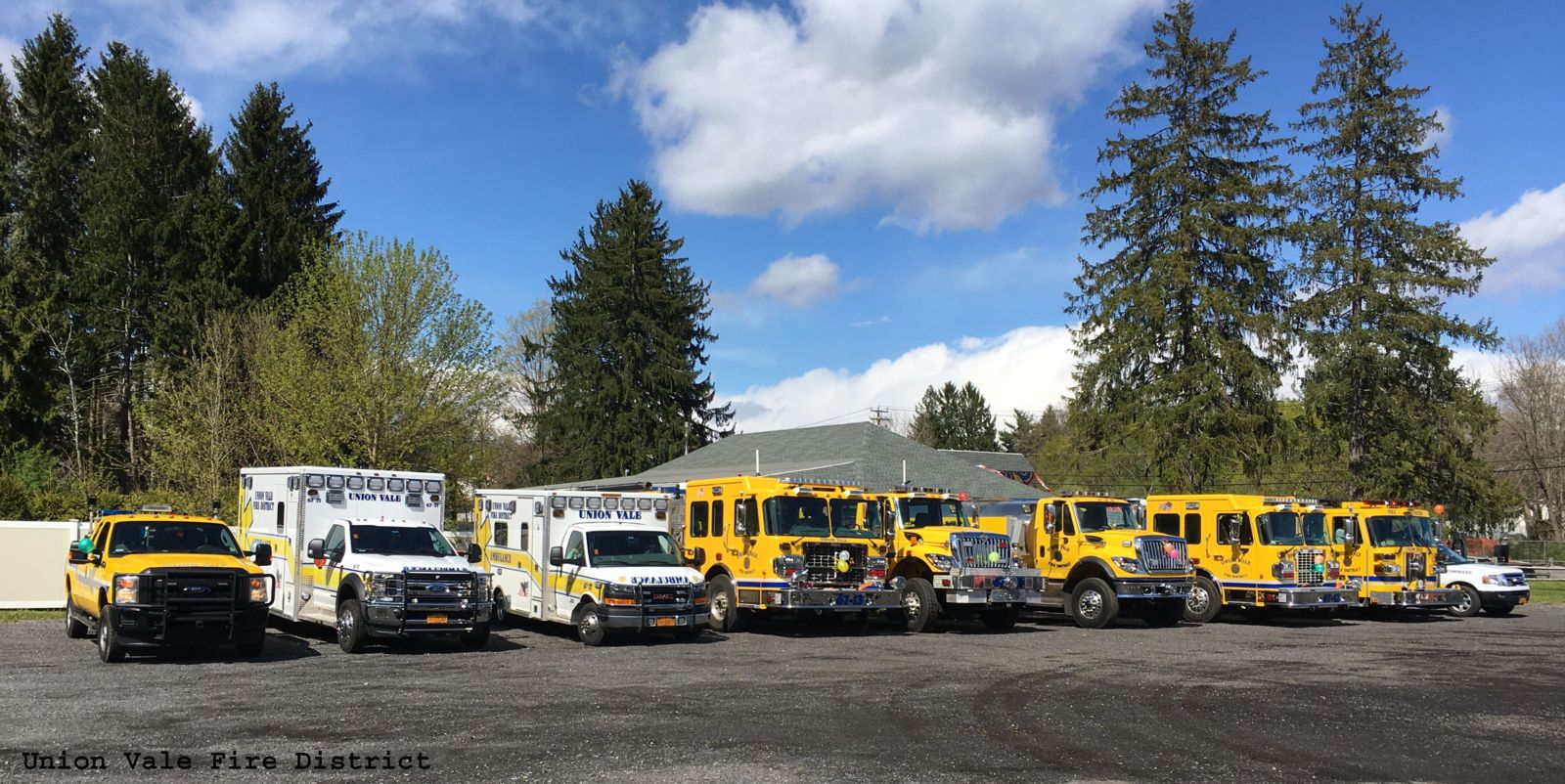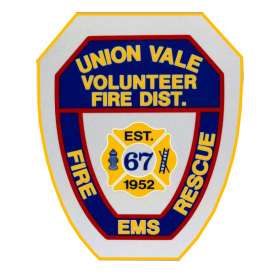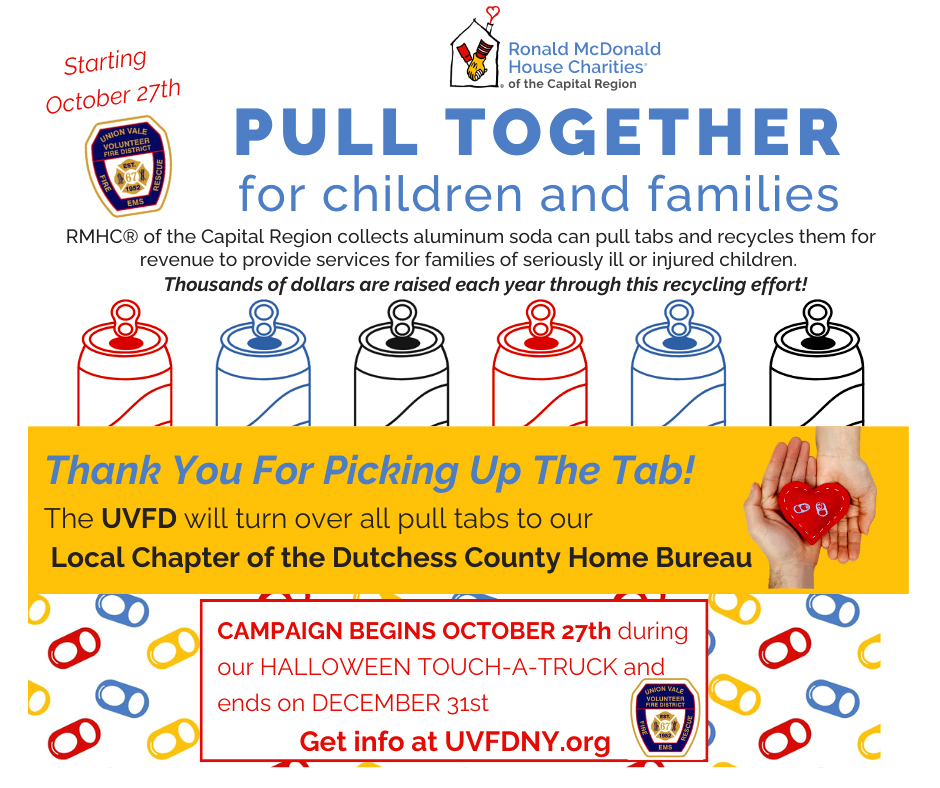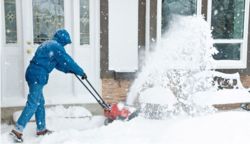| Upcoming Events |
| Workshop Meeting |
|
|
| Board of Fire Commissioners Meeting |
|
|
| View All Events |
| 2025 Incidents | |
| January | 71 |
| February | 54 |
| March | 38 |
| April | 53 |
| May | 53 |
| June | |
| July | |
| August | |
| September | |
| October | |
| November | |
| December | |
| Total | 269 |
| 2024 Incidents | |
| January | 58 |
| February | 59 |
| March | 60 |
| April | 55 |
| May | 61 |
| June | 88 |
| July | 75 |
| August | 64 |
| September | 47 |
| October | 58 |
| November | 58 |
| December | 63 |
| Total | 746 |
| Web Counters | ||||||
|
|
Welcome to the Official Website for Union Vale Fire District
Union Vale Fire Company ‘Pulls It’ Together UNION VALE - The Union Vale Fire Company is working in conjunction with our local chapter of the Eastern District Home Bureau’s Dutchess County Chapter, Real People, organizing a ‘Pull Tab’ campaign to collect ALUMINUM pull tabs for Ronald McDonald House (RMHC) in Albany, NY. The campaign will run for the entire year of 2025. We invite Union Vale residents and our neighbors to participate and help us collect as many tabs as possible! All aluminum tabs collected will be given to the Real People Chapter of DC Home Bureau who in turn will donate them to Ronald McDonald House Charities in Albany. NEW - People can now drop off their aluminum tabs at Union Vale Town Hall, 249 Duncan Road, (GPS) LaGrangeville, at Tymor Park, Monday through Thursday from 10 a.m. to 4 p.m. According to RMHC of the Capital Region’s website, it states they collect aluminum pull tabs which are recycled to raise funds for their mission. They suggest collecting aluminum tabs from soda, soup, pet food, and other canned goods such as tennis ball cans and anything else with an aluminum pull tab. RMHC works with a local recycler to redeem the tabs for money to support families with seriously ill or injured children. Supporters and friends of all ages can pull together to help children and families! What is a Pull Tab: A pull tab is the piece of aluminum that opens the cans. Like the can, the pull tab can be recycled and redeemed for cash. It is a small yet valuable item! Steel vs. Aluminum: Aluminum pull tabs only. You can determine one from the other by using a magnet. Why collect pull tabs: Collecting pull tabs make it easy to recycle and help RMHC of the Capital Region at the same time! You can collect pull tabs on your own at home, or collect them with a group at school, at work, or anywhere else you can think of! Thousands of dollars are raised each year when people Pull Together! Our initial campaign began on Oct. 27 and to date we have collected over 50 pounds of aluminum tabs. NEW - You can now drop off your aluminum tabs at Union Vale Town Hall, 249 Duncan Road, thanks to the Town Clerk! UVFD will have a container there! If you wish to participate or have any questions, please contact our Public Relations Officer, Kathy Welsh at UVFDPIO@gmail.com Fun Facts! 1 pull tab = 1 inch 12 pull tabs = 1 foot 1,267 pull tabs = 1 pound 63,360 pull tabs = 1 mile 1,000,000 pull tabs = 790 pounds 1,578,044,160 pull tabs = 1 trip around the earth
For Rescue Squad - www.paypal.me/UVRS Thank you in advance! Join Us! We have a total of approximately 55 volunteer firefighters, fire police, EMTs, and drivers. Help us continue as a volunteer organization by donating a portion of your time to your community. All training and equipment is provided at no cost to the volunteer. If you have questions, please contact the president at PresidentUVFD@gmail.com
Snow Thrower Safety
The U.S. Consumer Product Safety Commission (CPSC) wants you and your family to be safe when using snow throwers. CPSC has received reports of injuries with snow throwers, including finger amputations. Injuries most frequently occur when consumers tried to clear the auger/collector or discharge chute with their hands. People have died after becoming caught in the machine. Others have died from carbon monoxide poisoning resulting from leaving the engine running in an enclosed space. CPSC offers the following safety tips for using snow throwers: • Stop the engine and use a long stick to unclog wet snow and debris from the machine. Do not use your keep hands to unclog a snow thrower. • Always keep hands and feet away from all moving parts. • Never leave the machine running in an enclosed area. • Add fuel to the tank outdoors before starting the machine; don’t add gasoline to a running or hot engine. Always keep the gasoline can capped, and store gasoline out of the house and away from ignition sources. • If you have an electric-powered snow thrower, be aware of where the power cord is at all times. Most snow thrower injuries happen when consumers try to clear snow from the discharge chute or debris from the auger/collectors. Always stop the engine before attempting to clear snow and debris from any part of the snow thrower.
|




 NEW - If you wish to make a donation to the Fire Company, please visit
NEW - If you wish to make a donation to the Fire Company, please visit 
